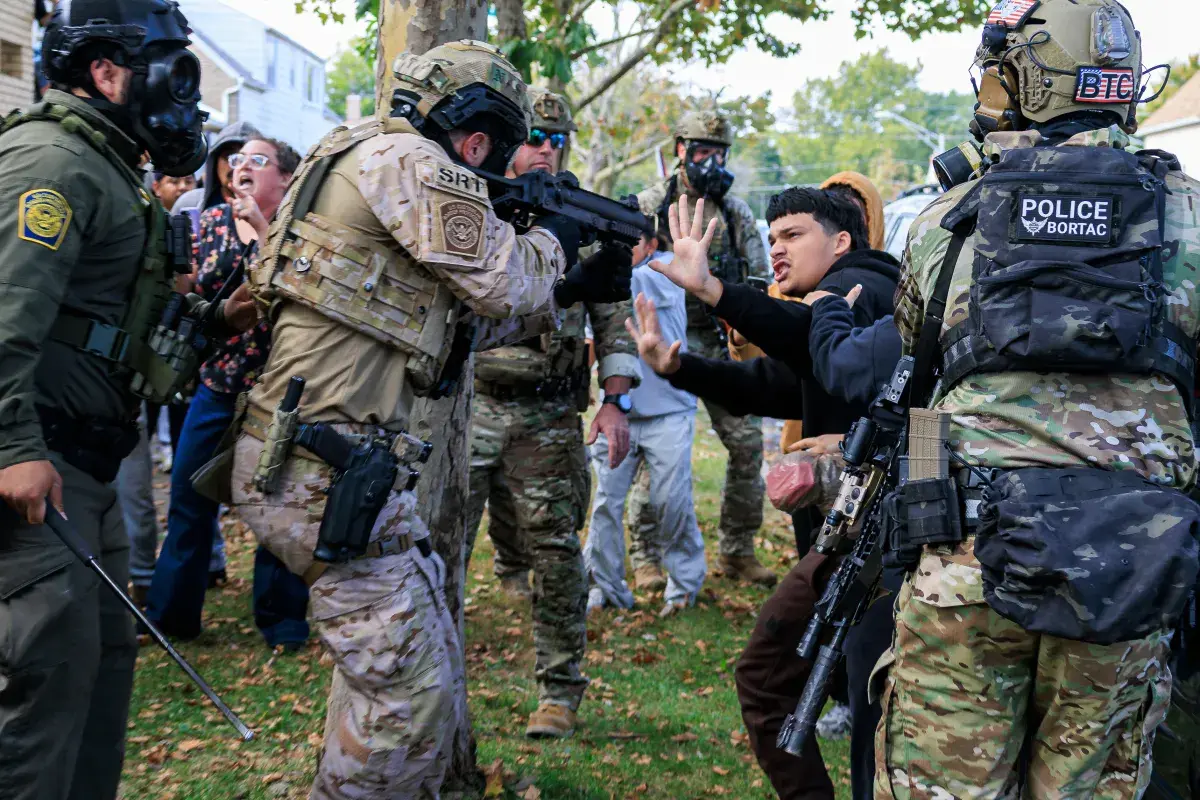Copyright Newsweek

A federal court in Chicago has ordered sweeping new limits on U.S. Immigration and Customs Enforcement (ICE) operations in the Midwest, ruling that agents repeatedly violated federal law and a binding consent decree by arresting people without warrants. The decision issued October 7 by U.S. District Judge Jeffrey I. Cummings extends court oversight of the agency until February 2, 2026, and warns that officers who disregard the order could face contempt or criminal referral. Newsweek reached out to ICE, the offices of Chicago Mayor Brandon Johnson and Illinois Governor JB Pritzker for comment via email. Why It Matters The ruling marks a rare judicial rebuke of federal immigration enforcement, signaling that ICE agents themselves can be held legally accountable for overstepping constitutional limits. By extending a consent decree and imposing new oversight measures, Cummings effectively transformed what had been an internal policy dispute into a test of whether federal courts can police the enforcers of immigration law. The decision reinforces due process protections for immigrants and citizens alike, curbing warrantless arrests and asserting that even federal agents must answer to the same legal standards they are sworn to uphold. A Settlement That Should Have Set the Rules The case Castañón Nava v. Department of Homeland Security stems from a 2022 settlement requiring ICE to follow strict procedures for warrantless arrests for civil immigration violations across Illinois, Indiana, Wisconsin, Missouri, Kentucky and Kansas. The settlement agreement took effect on May 13, 2022, and was to remain in place until February 2, 2026. Key obligations under the 2022 settlement: ICE must issue and distribute a nationwide policy on warrantless arrests and vehicle stops. For any non-citizen arrest made without an administrative warrant, ICE must document in its I-213/record: the fact of no warrant, location type (residence, business, vehicle, public area), employment or residence status if at business or home, community ties (such as family, home, job) if known, and specific factual basis that the person was “likely to escape before a warrant could be obtained.” For vehicle stops involving ICE, the settlement requires ICE to document the facts supporting reasonable suspicion that a person in the vehicle lacked lawful status. ICE must share documentation of these arrests in the covered jurisdiction with plaintiffs’ counsel to allow for enforcement and monitoring. Judge Finds ICE in Violation Cummings found that ICE “arrested twenty-two out of the twenty-six claimant class members without a warrant in violation of the Agreement and the requirements of 8 U.S.C. § 1357(a)(2).” The court concluded that the agency’s Chicago field office “failed to substantially comply with [the agreement’s] terms,” citing practices such as agents carrying blank administrative-warrant forms—known as Form I-200s—and filling them out after detaining individuals. Cummings wrote that the tactic was “explicitly designed to circumvent the requirement that officers have probable cause before a warrantless arrest.” Under the modified order, ICE must reissue its national policy on warrantless arrests, certify that all relevant personnel are retrained, and file monthly public reports identifying every arrest made without a pre-issued warrant since June 11. The judge also directed the Department of Homeland Security to produce “names, A-numbers, and arrest documents” for each case. Agents are now required to document, in real time, the specific facts supporting any claim that a person “is likely to escape before a warrant can be obtained,” the statutory standard for such arrests. The Department of Homeland Security said in a statement reported on ABC 7 Chicago that it “complies with all lawful court orders and is addressing this matter with the court.” Immigrant-rights lawyers hailed the decision as a rare judicial check on enforcement practices they say have expanded since early 2025. Mark Fleming, litigation director at the National Immigrant Justice Center, told ABC 7 Chicago, “What we have seen now to a much larger scale is federal agents indiscriminately stopping and arresting people without warrants and without [the] probable cause required by federal immigration laws.” The ruling followed evidence that agents in large-scale enforcement operations such as Operation Midway Blitz conducted mass workplace and residential raids across the region. Court filings described, among others, twelve restaurant workers in Liberty, Missouri, who were detained for hours in a locked dining room while armed officers blocked exits. The judge found that those employees “would have reasonably believed that they were not free to leave” and that ICE’s records “did not include any facts that would provide probable cause” for flight risk. One exception involved a worker with a prior removal order, whose arrest the court deemed lawful. Cummings stopped short of granting the three-year extension plaintiffs sought, saying a shorter continuation would provide “the full three-year term...for which they bargained.” Still, he left open the possibility of contempt proceedings should violations persist, a measure that legal experts note could expose individual agents to sanctions or even arrest if they defy the court. Gil Soffer, ABC 7’s chief legal analyst, said the government “is likely to appeal,” but acknowledged that “Judge Cummings is certainly sending a shot across the bow...If it’s going to be abided by, that’s going to slow things down and really impose rigor around the process.” A Turning Point for Accountability Insha Rahman, the vice president of advocacy and partnerships at the Vera Institute of Justice, told Newsweek that the court’s order in Chicago reflects a broader principle that “no one who wears the badge of public safety should be able to abuse their power or break the law.” She noted that while the public debate has focused on Pritzker’s and Johnson’s political response to federal troop deployments and immigration enforcement, the judge’s decision underscores the same theme: accountability for all levels of law enforcement. Rahman described the ruling as “very consequential,” emphasizing that it not only opens the door to potential prosecutions of ICE officers who violate the decree but also reasserts judicial authority to curb overreach in federal policing. She added that so far, no prosecutions have been reported under the new order, partly due to the broader federal court slowdown, but said the decision itself “sets an important precedent for how power is exercised in the name of public safety.” ICE Can Still Detain—But Within the Law The court’s action does not eliminate ICE’s authority to detain individuals subject to lawful warrants. Rather, it reinforces that such power “must be exercised within the framework Congress established,” the opinion stated. As immigrant advocates prepare to monitor compliance through February, both sides agree on at least one point: the Chicago order represents a defining test of how far federal courts can go in policing the nation’s immigration-enforcement machinery. What People Are Saying Cruz Rodriguez, a Cook County assistant public defender, said at a news conference earlier this month: “I have had numerous conversations with clients who are presented with a difficult decision of either missing court and receiving an arrest warrant or coming to court and risk being arrested by ICE.” Alexa Van Brunt, the director of MacArthur Justice Center’s Chicago Office, said in a statement: “We are gratified that the Chief Judge has exercised his authority to protect our communities, which have been under constant attack by ICE and other federal agents. This is a necessary and overdue action to ensure that the people of Cook County can access the courts without fear.” What Happens Next The Justice Department is expected to appeal Cummings’ ruling to the Seventh Circuit, challenging his authority to threaten contempt against federal agents. In the meantime, ICE must comply with the order by reporting all warrantless arrests, retraining officers, and meeting monthly with plaintiffs’ lawyers to document compliance. Cummings will hold a follow-up hearing in November, and further violations could trigger contempt proceedings against individual agents. The outcome of the appeal will determine whether the Chicago ruling becomes a regional anomaly or a national precedent for holding federal immigration officers personally accountable to the courts.



